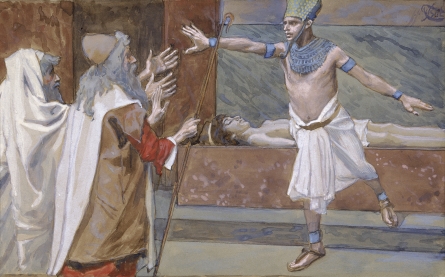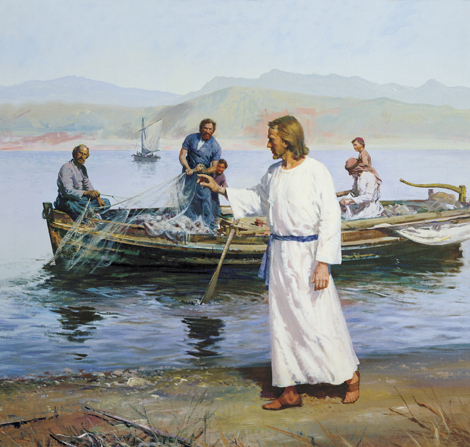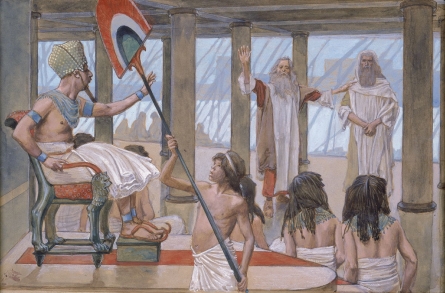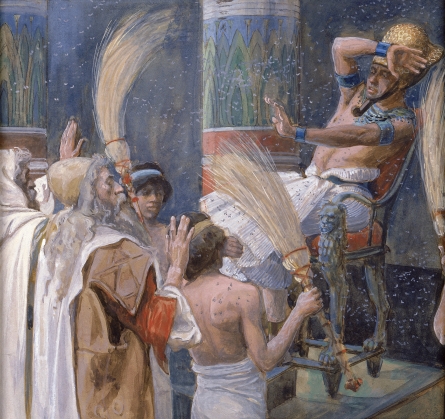This is the second in a four-part series about Moses and the Exodus.
Moses’ life can be divided into three 40-year time spans: his early years in Egypt, his sojourn in Midian and his mission as a prophet of God. The first article discussed his early years in Egypt and his sojourn in Midian. Now the time had come for Moses to begin the third phase. Moses returned to Egypt with his wife and sons. On the way, they met Aaron, Moses’ brother, who had been told by God to meet them. The stage was now set for one of the most magnificent displays of God’s power, patience and love for all of His children. Mormon scholar Kent S. Brown, professor of ancient scripture and director of ancient studies at Brigham Young University, wrote:
… The experience of the Israelites both before and during the Exodus formed a major focus for their faith in God from the age of Moses until our own day. For it was in this series of events that God revealed His mighty arm—and profound mercy—on behalf of an obscure, enslaved people whom He chose and then freed in order to bear His covenant of life and salvation to the nations of the earth. … In terms of Jehovah’s dealings with His people, the one act that characterized Him in the minds of ancient Israelites was His engineering their Exodus from Egypt. …
Notwithstanding the enormous emphasis and wide thematic treatment of the Exodus in scripture as a foremost focus of faith, it should also be recognized that the book of Exodus itself reveals an effort made by God to engender within the Israelites an absolutely firm trust in Himself.
But the road would not be without challenges. The extent of the efforts that God had to exert to gain the trust of the Israelites as well as the Egyptians underscores the enormity of the task at hand.
Spiritual Bondage
Perhaps the greatest challenges for the children of Israel were spiritual. Their spiritual chains ran deep. During their 400 years in slavery in the land of Egypt, the children of Israel had forgotten the God of their fathers. Mormon scholar Bruce Satterfield, professor of religion at Brigham Young University—Idaho, explained:
During this period of time, the Israelites gradually began to believe in and worship the Egyptian gods. Like most peoples of the ancient Near East, the Egyptians were polytheistic; that is, they believed in many gods. To the Egyptians, these gods controlled all the elements that allow men to live. They believed that by performing various rituals the gods would look kindly upon them and control the elements in such a way that mankind could survive and be happy. These rituals often involved immoral acts performed during the ritual action in the presence of the idols of the various gods located in temples or sanctuaries. As the Israelites began to follow Egyptian religious practices, they lost the knowledge of the gospel, the religion of the God their fathers, Abraham, Isaac, and Jacob.
However, the Lord was not going to allow this situation to continue. According to the promise that he had made with Abraham (that he would bless Abraham’s posterity with the gospel), the Lord now set his hand to restore Israel to the knowledge of the gospel.
Emphasizing the importance of choice, Elder Quentin L. Cook emphasized:
God intended that men and women would be free to make choices between good and evil. When evil choices become the dominant characteristic of a culture or nation, there are serious consequences both in this life and the life to come. People can become enslaved or put themselves in bondage not only to harmful, addictive substances but also to harmful, addictive philosophies that detract from righteous living.
Turning from the worship of the true and living God and worshipping false gods like wealth and fame and engaging in immoral and unrighteous conduct result in bondage in all its insidious manifestations. These include spiritual, physical, and intellectual bondage and sometimes bring destruction.
A Crisis of Doubt
Moses’ mission was to free the Israelites from both spiritual and temporal bondage. If Moses thought this work would be easy, he was mistaken. The Israelites had lost the religion—and the faith—of their fathers. Professor Brown wrote:
The idea of Israel’s inclination to doubt was already present in Moses’ interview with Jehovah during his call. (See Exodus 3–4.) This notion first appeared in Moses’ question about God’s name, for Moses was certain that the Israelites would not believe his announced purpose to deliver them from bondage if he could not repeat a name which the Israelite elders would recognize. (See Exodus 3:13.) Further, the signs which Moses was to perform—changing his rod to a serpent, making his hand leprous, and changing water to blood (see Exodus 4:1–9)—constituted a second indication of natural Israelite skepticism.
The skepticism didn’t end there. And the Israelites weren’t the first to express it once Moses returned to his place of birth. Professor Brown wrote:
After his return to Egypt, Moses’ first encounter with disbelief did not come in his initial meeting with the Israelite leaders but, remarkably, in his opening clash with Pharaoh. In that scene, narrated in chapter 5, we read that Pharaoh asked, “Who is the Lord [i.e., Jehovah], that I should obey his voice to let Israel go? I know not the Lord, neither will I let Israel go” (Exodus 5:2).
Pharaoh believed, it is clear, that he knew all the gods who mattered as far as Egyptian affairs were concerned. And then turning despotic, he decided to crush the Israelite’s unrest by requiring them to gather their own straw. We all remember the response of the Israelites when the proclaimed deliverers, Moses and Aaron, were returning to the Israelite villages after that first disappointing meeting with Pharaoh: “The Lord look upon you, and judge; because ye have made our savour to be abhorred in the eyes of Pharaoh, and in the eyes of his servants, to put a sword in their hand to slay us” (Exodus 5:21).
But the Lord had a purpose—even if the Israelites and Egyptians didn’t understand. Professor Brown explained:
The upshot of this scenario with Pharaoh and its resulting difficulties for the children of Israel was that even slaves, to obtain freedom, would have to suffer, in the language of Paul, “the loss of all things” (Philippians 3:8). Unbeknownst to the Israelites, they were beginning to be forced by God to rely neither on the now capricious Pharaoh and his foremen nor on their own abilities and resources. Said another way, the mainstays of their secure world, such as it was, had begun to collapse. Instead, God had begun to propel Israel toward a situation in which they would have to rely on Him alone, not upon anything or anyone else.
Thus, the crisis of doubt would become a lesson on faith.
The Hebrew God vs. Egypt’s Gods
After Pharaoh refused to let the children of Israel go, Moses levied a series of plagues under the direction of Jehovah—the God of the Hebrews. In the first plague, Moses turned the water in the river Nile to blood, killing all the fish and rendering the water not drinkable. Pharaoh’s magicians did the same. But how did they replicate God’s power? The late President Joseph F. Smith explained:
All down through the ages and in almost all countries, men have exercised great occult and mystical powers, even to the healing of the sick and the performing of miracles. Soothsayers, magicians, and astrologers were found in the courts of ancient kings. They had certain powers by which they divined and solved the monarch’s problems, dreams, etc. One of the most striking examples of this is recorded in Exodus, where Pharaoh called “the wise men and the sorcerers” who duplicated some of the miracles the Lord had commanded Moses and Aaron to perform. When Aaron threw down his rod, it became a serpent. The Egyptian magicians threw down their rods, and they also became serpents. …
… The Savior declared that Satan had the power to bind bodies of men and women and sorely afflict them [see Matthew 7:22–23; Luke 13:16]. If Satan has power to bind the bodies, he surely must have power to loose them. It should be remembered that Satan has great knowledge and thereby can exercise authority and to some extent control the elements, when some greater power does not intervene. (Answers to Gospel Questions, 5 vols. [1957], 1:176, 178).
The plagues were a deliberate showing of the power of the God of the Hebrews—that He is the only God. Professor Satterfield wrote:
The plagues were intended to accomplish two things: (1) to show to both Egypt and Israel that the gods of Egypt were false, and thus (2) to soften Pharaoh’s heart so that he would follow the only true and living God and allow the children of Israel leave Egypt. Each plague was designed to accomplish this by showing that the God of the Hebrews had power over the various elements that the Egyptians believed were controlled by their false gods. For example, the Egyptians believed that the Nile was controlled by the god Hapi. However, when the Lord through Moses caused the Nile to turn to blood (a sign of death), the Egyptians religious rituals could not stop the plague but only add to it. Hence, Egypt was shown that the God of the Israel had control over the life-giving Nile and not their false deity, Hapi. Further, through the progression of each plague, Egypt and Israel was shown that the God of Israel was not limited in power but in fact the God over all the earth.
After the third plague, Pharaoh’s magicians told him: “This is the finger of God” (Exodus 8:19). But Pharaoh would not listen. The first three plagues—turning the river water to blood and infestations of frogs and lice— afflicted both Hebrews and Egyptians. But this changed with the fourth plague. Professor Brown wrote:
… Beginning with the plague of the flies, the plagues that ravaged Egypt made a clear distinction between the Israelite slaves and the Egyptians. (See Exodus 8:23; Exodus 9:4–7.)
God’s Purpose for Plaguing Egypt
It is at this point that some wonder why God punished the Egyptians with so many terrible plagues. Why did He not stay His hand? Why did God, as the scriptures say, harden Pharaoh’s heart? The answer to this question lies in another scriptural account. The Latter-day Saint Old Testament Manual explains:
The Joseph Smith Translation of Exodus 4:21 says, “I will prosper thee; but Pharaoh will harden his heart, and he will not let the people go.” This truth must be remembered in all subsequent references to the pharaoh’s heart being hardened. …
God gave the pharaoh a chance to let Israel go, of his own free will, to worship God. Through his refusal the pharaoh could blame no one but himself for the consequences.
The Lord allows the wicked, in this case Pharaoh, agency to choose as they will “according to the hardness of their hearts, that the judgments which he shall exercise upon them in his wrath may be just; and the blood of the innocent shall stand as a witness against them at the last day” (Alma 14:11).
As President Boyd K. Packer said:
We are free to choose what we will and to pick and choose our acts, but we are not free to choose the consequences. They come as they will come.
Elder Gerald N. Lund said:
The heart is a tender place. It is sensitive to many influences, both positive and negative. It can be hurt by others. It can be deadened by sin. It can be softened by love. …
Individual agency is so sacred that Heavenly Father will never force the human heart, even with all His infinite power. Man may try to do so, but God does not. To put it another way, God allows us to be the guardians, or the gatekeepers, of our own hearts. We must, of our own free will, open our hearts to the Spirit, for He will not force Himself upon us.
Thus, the Lord allowed Moses to plague the Egyptians until the pharaoh had softened his heart enough to let the children of Israel go.
Israel’s Oppressors Suffer Plagues
The plagues inflicted upon the Egyptians grew more severe as they went on. Again, each was an attempt to get Pharaoh to let Moses’ people go. In the fifth plague, all of the cattle—including horses, asses, camels, oxen and sheep (Exodus 9:3)—belonging to the Egyptians died. In the sixth, the Egyptian people and beasts were covered in boils (Exodus 9:8-11). In the seventh, hail and fire destroyed many of Egypt’s crops (Exodus 9:22-26).
After each plague, Pharaoh pled with Moses to stay God’s hand, saying that he would let the people go. And then he backtracked on his promise. But the response was different with the next plague. Elder Hugh W. Pinnock said:
After being threatened with hordes of locusts, Pharaoh agreed to let the men go if Moses would leave the women, the young, and the old behind. (See Exodus 10:3–11.)
However, Moses insisted that all should go. He said, “We will go with our young and with our old, with our sons and with our daughters, with our flocks and with our herds will we go” (Exodus 10:9). Moses refused to divide the people of God.
All ages would share the adventure and the dangers together…. The solidarity of the people of all ages is God’s way of doing things.
Moses refused to divide the people, and Pharaoh again refused to let the Hebrews go. Thus, the Lord sent the plague of locusts, which ate whatever greenery remained (Exodus 10:12-15). And in the ninth, there was three days of darkness (Exodus 10:21-23).
Of these plagues, the Old Testament Manual states:
There have been numerous attempts through the ages to explain the plagues described in these chapters of Exodus. Some have tried to show that the various plagues were the result of some natural phenomenon such as passing meteorites or the explosion of a volcanic island in the Mediterranean Sea. While there is some degree of logical progression in the plagues (the river’s pollution could have driven the frogs out of the marshes to die, and this situation would then have bred lice, flies, and disease), it is not possible at present to explain how the Lord brought about these miraculous events. The fact that the plagues were selective (that is, sent upon the Egyptians but not the Israelites) adds to their miraculous nature. God often works through natural means to bring about His purposes, but that fact does not lessen the miraculous nature of His work. In the plagues and eventual deliverance of Israel from the bondage of Egypt is a record of remarkable and miraculous intervention by God in behalf of His children. How He actually intervened is not nearly so significant as that He did intervene.
The other point to note is that God did not destroy the Egyptians in one great display of power. In His mercy, God gave them many chances to let His people go. And God warned them what would happen if they did not let His people go. But, even after nine attempts to gain their attention, the Egyptians would not heed the God of Israel.
The Last and Final Plague
Thus God commanded the tenth and final plague:
For I will pass through the land of Egypt this night, and will smite all the firstborn in the land of Egypt (Exodus 12:12).
This plague was to be different. The Israelites would not escape this plague without showing faith by participating in the ordinance of the Passover. Those who refused to do so would not be spared. This was to be in similitude of the future sacrifice of the Lamb of God—His Son, Jesus Christ. Elder W. Christopher Waddell explained:
For protection against “the destroyer” (Exodus 12:23), the Lord instructed His people to offer a sacrifice, a lamb “without blemish” (verse 5), and to collect the blood from the sacrifice. They were then to “take of the blood” and apply it to the entrance of each home—“the two side posts and … the upper door post” (verse 7)—with this promise: “And when I see the blood, I will pass over you, and the plague shall not be upon you to destroy you” (verse 13).
“The children of Israel went away, and did as the Lord had commanded” (verse 28). They offered the sacrifice, collected the blood, and applied it to their homes. “And it came to pass, that at midnight the Lord smote all the firstborn in the land of Egypt” (verse 29). Moses and his people, according to the promise of the Lord, were protected.
The blood used by the Israelites, symbolic of the Savior’s future Atonement, was a product of the sacrifice they had offered. Nevertheless, the sacrifice and the blood alone would not have been sufficient to obtain the promised blessing. Without the application of the blood to the door posts, the sacrifice would have been in vain.
It was after this final, devastating event that Pharaoh relented. Exodus 12:30-31 states:
And Pharaoh rose up in the night, he, and all his servants, and all the Egyptians; and there was a great cry in Egypt; for there was not a house where there was not one dead.
And he called for Moses and Aaron by night, and said, Rise up, and get you forth from among my people, both ye and the children of Israel; and go, serve the Lord, as ye have said.
Pharaoh finally let Moses’ people leave—but they were not yet free. True freedom, for some, would take much longer than Moses likely imagined.
1. Moses & the Exodus: The Lord Prepares a People and a Prophet
2. Moses and the Exodus: Pharaoh and the Plagues
3. Moses and the Exodus: Leading the Children of Israel out of Bondage
4. Moses and the Exodus: Learning to Live the Ten Commandments




